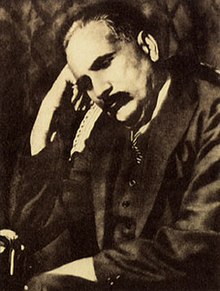Allama Iqbal (Urdu: علامہ اِقبال) (November 9, 1877 – April 21, 1938), widely known as Muhammad Iqbal, was a poet, philosopher, and politician, as well as an academic, barrister and scholar[1][2] in British India who is widely regarded as having inspired the Pakistan Movement. He is called the "Spiritual Father of Pakistan " [3] He is considered one of the most important figures in Urdu literature,[4]with literary work in both Urdu and Persian.[2][4]
Iqbal is admired as a prominent poet by Pakistanis, Iranians and other international scholars of literature.[5][6][7] Though Iqbal is best known as an eminent poet, he is also a highly acclaimed "Muslim philosophical thinker of modern times".[2][7] His first poetry book, The Secrets of the Self, appeared in the Persian language in 1915, and other books of poetry include The Secrets of Selflessness, Message from the East and Persian Psalms. Amongst these, his best known Urdu works are The Call of the Marching Bell, Gabriel's Wing, The Rod of Moses and a part of Gift from Hijaz.[8] Along with his Urdu and Persian poetry, his Urdu and English lectures and letters have been very influential in cultural, social, religious and political disputes.[8]
In 1922, he was knighted by King George V,[9]granting him the title "Sir".[10] While studying law and philosophy in England, Iqbal became a member of the London branch of the All-India Muslim League.[7][8] Later, during the League's December 1930 session, he delivered his most famous presidential speech known as the Allahabad Address in which he pushed for the creation of a Muslim state in northwest India.[7][8]
In much of South Asia and the Urdu speaking world, Iqbal is regarded as the Shair-e-Mashriq (Urdu: شاعر مشرق, "Poet of the East").[11][12][13] He is also called Mufakkir-e-Pakistan (Urdu: مفکر پاکستان, "The Thinker of Pakistan"), Musawar-e-Pakistan (Urdu: مصور پاکستان, "Artist of Pakistan") and Hakeem-ul-Ummat (Urdu: حکیم الامت, "The Sage of the Ummah"). The Pakistan government officially named him "National Poet of Pakistan".[7] His birthday Yōm-e Welādat-e Muḥammad Iqbāl (Urdu: یوم ولادت محمد اقبال), or Iqbal Day, is a public holiday in Pakistan.[14]
Sir Muhammad Iqbal's house is still located in Sialkot and is recognized as Iqbal's Manzil and is open for visitors.[15]

No comments:
Post a Comment